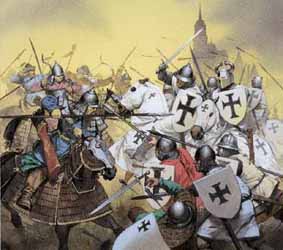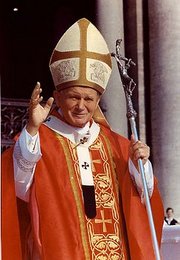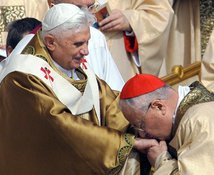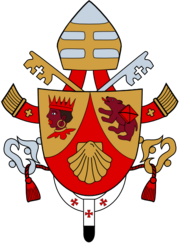Date: Sat, 17 Dec 2005 00:33:45 -0500
From: Eric Jon Phelps
To: Robert M. Stockmann
Cc: skolnick@ameritech.net, cloak.dagger@gmail.com
Subject: Re: a new conspiracy has been shown up
Parts/Attachments:
1 OK 64 lines Text
2 Shown 99 lines Text
----------------------------------------
Dear Robert,
Thank you for the thought regarding the Teutonic Knights. As you must
know, the German Teutonic Knights, with uniforms being identical in their
colors with Bavarian Roman Catholic Heinrich Himmler's SS, "Order of the
Death's Head" (black trimmed with silver), were the Pope's crusaders led
by Emperor Frederick Barbarossa. The Teutonic Knights always executed
the will of its master in Rome and were never anti-Rome, or truly
Protestant. Their rule was Augustinian; Himmler's rule was that of the
Jesuits.
To assert that the German Teutonic Knights descended into the hands of
the Protestant Lutheran Prussians is a popish error. We must remember
that the Knights were formally disbanded by Napoleon, the Roman Catholic
Masonic Jesuit-advised Avenger for the Order, in 1806; they were then
revived under the name of the New Templars by occult Freemason George
Lanz in 1912, that former Roman Catholic priest who met Hitler at Lambach
Abbey when Hitler was a boy; the priest who openly left the priesthood,
openly became a Lutheran, openly turned anti-Jesuit, yet remaining a
Jesuit Temporal Coadjutor in accordance with the bloody Jesuit Oath.
After the death of Freemason List, Freemason Lanz was the immediate
influence upon both Hitler and Himmler, those Roman Catholic Jesuit
Temporal Coadjutors who destroyed Protestant Prussia via their
connections with Jesuit-trained Joseph Stalin and his Jesuit-ruled
"headhunters," the NKVD. Yes, the head of the NKVD and also a Lubyanka
General was the Jesuit, who aided Stalin in the murder of his (the
Jesuit's) Jewish wife, Alexander N. Poskrebyshev.
The Order then carried out the designs of Lanz with regard to the Jews of
Europe and Western Russia, along with the mass-murder of 20 million
"heretic" Orthodox Russian Christians---aided by Stalin himself. After
the war Himmler and his Teutonic Knights were saved by Allied
Intelligence---the British SIS and the American OSS, both led by the
Knights of Malta---via Pope Pius XII's Vatican Ratlines.
Meanwhile, the apostate Lutheran morphine drug addict and non-member of
the Teutonic SS, Prussian Herman Goering, paid with his life for
resisting Hitler's all-powerful Jesuit secretary, Martin Bormann. But
the obedient ex-Lutheran Bormann, disguised as a Jesuit, escaped to South
America via Bishop Hudal's Ratline. His, Adolf Martin, son became a
Jesuit "missionary" to the Congo.
In conclusion, the Jesuit Order rules the Papacy; it rules all secret
societies especially the Luciferian Masonic orders. It ruled Himmler and
his Teutonic Knights of the SS. Today, it rules the Knights of Malta
governing the CIA to the end that the NWO will be centered in that
Antichrist in Rome---the Pope who pretends to be Jesus Christ in the
flesh, the priest of Jerusalem---Melchisedec. To this no Bible-believing
Protestant or Baptist Calvinist would ever submit.
I trust this is helpful.
Sincerely in Faith,
Brother Eric
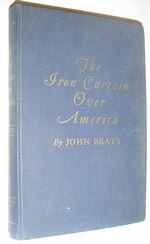
The Iron Curtain Over America
To get a good understanding about who the Teutonic Knights actually
were since the early mideaval ages, checkout Chapter I "The Teutonic Knights and Germany" inside
John Beaty's "Iron Curtain Over
America". In short, throughout history, the German Teutonic
Knights were the only Chivalric Order who could withstand the Pagan
Barbarian's from far east Europe, preventing Germany and other European
nation states falling down into a Sodom and Gomorrah alike "Civilization".
The author of The Iron Curtain Over America has written, or
collaborated on, a dozen books. His texts have been used in more than
seven hundred colleges and universities, and his historical novel,
Swords in the Dawn, published originally in New York, had London and
Australian editions, and was adopted for state-wide use in the public
schools of Texas. His education (M.A., University of Virginia; Ph.D.,
Columbia University; post-graduate study, University of Montpellier,
France), his travel in Europe and Asia, and his five years with the
Military Intelligence Service in World War II rounded out the
background for the reading and research (1946-1951) which resulted in
"The Iron Curtain Over America".
The Pope [Urban II, at Clermont, France, on November 26, 1095] crossed
the Alps from schism-torn Italy and, Frenchman himself, stirred the
people of France as he rode among them. In the chapel at Clermont, he
first swayed the men of the church who had answered his summons to the
meeting; then, surrounded by cardinals and mail-clad knights on a
golden-canopied platform in a field by the church, he addressed the
multitude:
You are girded knights, but you are arrogant with pride. You
turn upon your brothers with fury, cutting down one the other.
Is this the service of Christ? ... Come forward to the defense
of Christ.
The great Pope gave his eager audience some pertinent and inspiring
texts from the recorded words of Jesus Christ:
For where two or three are gathered together in my name, there
am I in the midst of them.
(The Gospel According to Saint Matthew, Chapter XVIII, Verse 20)
And every one that hath forsaken houses, or brethren, or
sisters, or father, or mother, or wife, or children, or lands,
for my namees sake, shall receive a hundredfold, and shall
inherit everlasting life.
(Saint Matthew, Chapter XIX, Verse 29)
To the words of the Saviour, the Pope added his own specific promise:
Set forth then upon the way to the Holy Sepulcher ... and fear
not. Your possessions here will be safeguarded, and you will
despoil the enemy of greater treasures. Do not fear death, where
Christ laid down His life for you. If any should lose their
lives, even on the way thither, by sea or land, or in strife
with the pagans, their sins will be requited them. I grant this
to all who go, by the power vested in me by God.
(Harold Lamb, op. cit., p. 42).
Through the long winter, men scanned their supplies, hammered out
weapons and armor, and dreamed dreams of their holy mission. In the
summer that followed, they "started out on what they called the voyage
of God" (Harold Lamb, op. cit., p. VII) As they faced East they shouted
on plains and in mountain valleys, "God wills it."
[ ... ]
The third body of medieval military-religious Crusaders was the
Knighthood of the Teutonic Order. This organization was founded as a
hospital in the winter of 1190-91 -- according to tradition, on a small
ship which had been pulled ashore near Acre. Its services came to be
so highly regarded that in March, 1198, "the great men of the army and
the [Latin] Kingdom raised the brethren of the German Hospital of St.
Mary to the rank of an Order of Knights" (Encyc. Brit., Vol. XXI, pp.
983-984). Soon, however, the Order found that "its true work lay on the
Eastern frontiers of Germany" (Encyc. Brit., Vol. XXI, p. 894). Invited
by a Christian Polish Prince (1226) to help against the still
unconverted Prussians, a body of knights sailed down the Vistula
establishing blockhouses and pushed eastward to found Koenigsburg in
1255. In 1274, a castle was established at Marienburg and in 1309 the
headquarters of the Grand Master was transferred (Encyc. Brit., Vol.
XIV, p. 886) from Venice to this remote border city on the Nojat River,
an eastern outlet of the Vistula (The Rise of Brandenburg-Prussia to
1786, by Sidney Bradshaw Fay, Henry Holt and Company, New York, 1937).
It was to the Teutonic Order that the Knight of Chaucers famous
Canterbury Tales belonged (Sections from Chaucer, edited by Clarence
Griffin Child, D. C. Heath & Co., Boston, 1912, p. 150). Chauceras
lines (prologue to the Canterbury Tales, II., 52- 53):
Ful ofte tyme he hadde the bord bigonne
Aboven alle naciouns in Pruce
tell us that this Knight occupied the seat of Grand Master, presumably
at the capital, Marienburg, and presided over Knights from the various
nations assembled in "Puce" (Prussia) to hold the pagan East at bay. In
his military-religious capacity Chaucer's Knight "fought for our faith"
in fifteen battles, including those in Lithuania and in Russia
(Prologue, II., 54-63).
The Teutonic Knights soon drove eastward, or converted to Christianity,
the sparsely settled native Prussian people, and assumed sovereignty
over East Prussia. They encouraged the immigration of German families
of farmers and artisans, and their domain on the south shore of the
Baltic became a self-contained German state, outside the Holy Roman
Empire. The boundaries varied, at one time reaching the Gulf of Finland
(see Historical Atlas, by William R. Shepherd, Henry Holt and Company,
New York, 1911, maps 77, 79, 87, 99, 119). "The hundred years from 1309
to 1409 were the Golden Age of the Teutonic Knights. Young nobles from
all over Europe found no greater honor than to come out and fight under
their banner and be knighted by their Grand Master" (Fay, op. cit., pp.
32-33). As the years passed, the function of the Teutonic Knights as
defenders, or potential defenders, of the Christian West remained
unchanged.
total 1076
-rw-rw-r-- 1 crashrec klant 623193 Apr 1 2008 Iron.Curtain.Over.America.pdf









